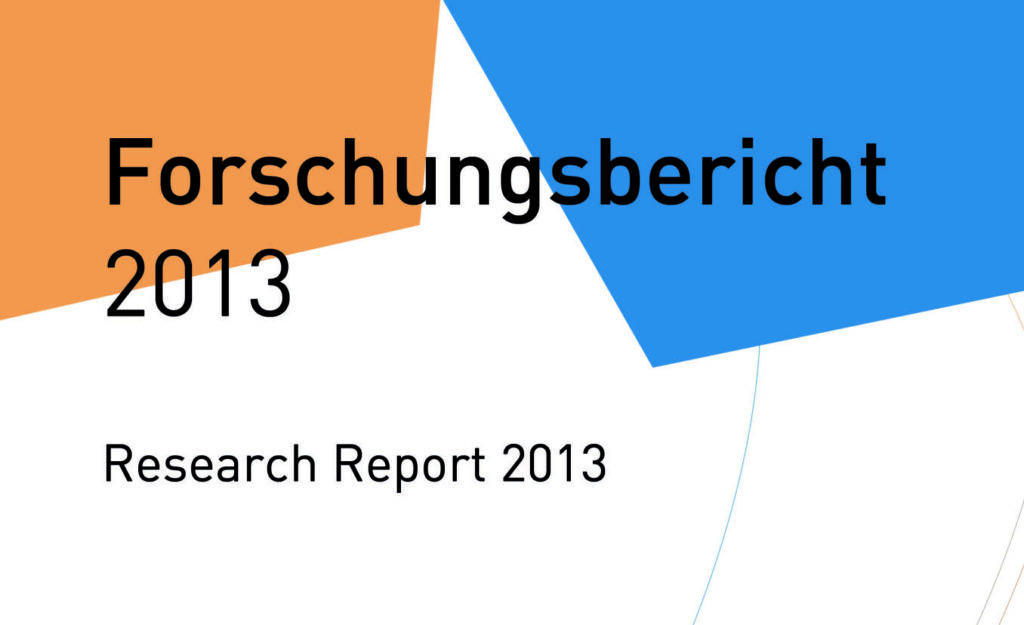
ZeMKI Research Report 2013
Editorial
2013 was a year of many activities and achievements for the Centre for Media, Communication and Information Research (ZeMKI). One of the main drivers for this development was the “Communicative figurations“ research group that had been recognized by the Academic Senate of the University of Bremen in 2011. The research group is based at the ZeMKI and part of a research network with the University of Hamburg. Via the Excellence Initiative of the University of Bremen, we received two professorships in communication and media studies as a “development fund” for five years. As early as in 2013, we were able to fill both positions with excellent scholars: in September 2013, Tanja Thomas joined as professor of communication and media studies with a focus on comparative cultural analysis (Lab “Social Theory and Media Culture Analysis“) and Thomas Friemel as professor of communication and media studies with a focus on innovative methods (Lab “Networked Communications“). So, the ZeMKI was strengthened by two additional labs.
Furthermore, the “Communicative figurations“ research network has been promoted to Creative Unit as part of the Excellence Initiative of the German Federal and State Governments. This is a one-time start-up fund for the further development of the interdisciplinary research approach of the research network. Essentially, it is the aim to develop an overarching concept to describe the transformation of the communicative construction of social realities. The Creative Unit started working in April 2013. The ZeMKI is thus involved in two science priorities of the University of Bremen: “Information, Cognition and Communication“ as well as “Social Change, Social Policy and the State“. Also in individual research the ZeMKI benefited from the future concept “Ambitious and Agile“ of the University of Bremen that has been awarded in the Excellence Initiative. Winfried Pauleit (Lab “Film, Media Art and Popular Culture“) was able to solicit an exploration project on “Audio History“.
In addition, quite a bit has happened in doctoral education. Besides the successfully completed dissertation by Cigdem Bozdag, we hosted the ECREA Summer School at the ZeMKI for the first time. This is an annual Doctoral Summer School of the European Communication Research and Education Association (ECREA), which will be organized at the ZeMKI from 2013 to 2015. The summer school is organized with great commitment by Leif Kramp, the research coordinator of the ZeMKI. For its performance, we were able to apply successfully for funding support by the DAAD (German Academic Exchange Service) in 2013 (and also for 2014). Doctoral education will be further strengthened by the junior research group “Transcultural public and solidarity in current processes of Mediatization“ for which Tanja Thomas could raise funds through the Hans-Boeckler-Foundation. In 2013, the scholarships were advertised. The training of young researchers is further supported by the many staff positions within the projects in the DFG priority programme 1505 “Mediatized Worlds“, coordinated by Friedrich Krotz, and in the CRC 597 “Transformations of the State“ as well as in many other third-party funding at the ZeMKI. The international networking of doctoral students and postdocs was intensified with the network BRESTOLON together with the universities Södertörn (Stockholm), Goldsmiths College (University of London) and the London School of Economics and Political Science (London). The members of the network gathered for the initial meeting in 2013. BRESTOLON strives to build up a regular international exchange between young scientists and scholars. And finally, the ZeMKI is involved as a “thematic group“ in the structuring of doctoral education in the humanities at the University of Bremen.
This increased activity resulted in a re-structuring of ZeMKI at the end of 2013: By a decision of the General Assembly, we introduced a steering committee consisting of the scientific coordinator of the ZeMKI, the lab directors of ZeMKI and representatives of the scientific staff. The task of the steering committee is to make fundamental decisions about research orientation. Such a gremium was deemed necessary for the further dynamic growth of ZeMKI: It currently has 58 members.
Overall, a preface like this one can only mention a few prominent points out off the activities that were accomplished in 2013. There was a variety of other research activities, exciting workshops and conferences and many, in part, widely acclaimed publications. This research report informs about all of this in detail.
The ZeMKI Research Report 2013 is available here.


